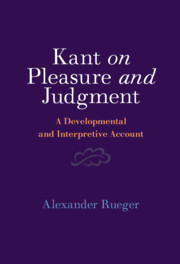Book contents
- Kant on Pleasure and Judgment
- Kant on Pleasure and Judgment
- Copyright page
- Contents
- Acknowledgments
- Abbreviations
- Introduction
- 1 The Early Reception of the Third Critique
- 2 The Completion of the System of the Powers of the Mind, 1770–1790
- 3 Kant’s Theory of the Feeling of Pleasure and Displeasure (I)
- 4 Kant’s Theory of the Feeling of Pleasure and Displeasure (II)
- 5 Consequences of the Theory
- 6 The Principle(s) of the Power of Judgment
- 7 The Interest of the Reflecting Power of Judgment and the Deduction of Judgments of Taste
- 8 The Imagination in Its Freedom
- 9 The Transition from Nature to Freedom
- Conclusion
- Bibliography
- Index
3 - Kant’s Theory of the Feeling of Pleasure and Displeasure (I)
Published online by Cambridge University Press: 19 April 2024
- Kant on Pleasure and Judgment
- Kant on Pleasure and Judgment
- Copyright page
- Contents
- Acknowledgments
- Abbreviations
- Introduction
- 1 The Early Reception of the Third Critique
- 2 The Completion of the System of the Powers of the Mind, 1770–1790
- 3 Kant’s Theory of the Feeling of Pleasure and Displeasure (I)
- 4 Kant’s Theory of the Feeling of Pleasure and Displeasure (II)
- 5 Consequences of the Theory
- 6 The Principle(s) of the Power of Judgment
- 7 The Interest of the Reflecting Power of Judgment and the Deduction of Judgments of Taste
- 8 The Imagination in Its Freedom
- 9 The Transition from Nature to Freedom
- Conclusion
- Bibliography
- Index
Summary
Kant adopts and transforms the views on pleasure found both in the empirical psychology of the Wolffian tradition as well as those of critics of this tradition like Crusius. The latter proposed that pleasure in an object results from the satisfaction of a desire or interest while the former conceived of pleasure as the perception of an object’s perfection. Mendelssohn’s analysis of pleasure combined aspects of both views and led to a characterization of the feeling as a preference we have to maintain the representation of an object in our mind when it satisfies our interest in perfection. We find this explication in the third Critique under the title of a “transcendental definition” of pleasure, that is, a definition of an empirical concept that employs only pure concepts of the understanding. The definition, together with the assumption that faculties have interests, leads to the principle that pleasure consists in the satisfaction of such interests.
Keywords
- Type
- Chapter
- Information
- Kant on Pleasure and JudgmentA Developmental and Interpretive Account, pp. 33 - 61Publisher: Cambridge University PressPrint publication year: 2024

